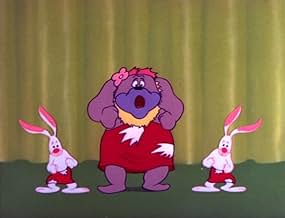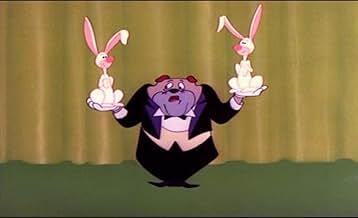IMDb RATING
7.7/10
1.3K
YOUR RATING
A magician seeks revenge against an opera singer for refusing to let him perform his magic act. He then devises what he thinks is a clever plan to enact his revenge with some hilarious resul... Read allA magician seeks revenge against an opera singer for refusing to let him perform his magic act. He then devises what he thinks is a clever plan to enact his revenge with some hilarious results.A magician seeks revenge against an opera singer for refusing to let him perform his magic act. He then devises what he thinks is a clever plan to enact his revenge with some hilarious results.
- Director
- Writers
- Stars
- Awards
- 1 win total
Daws Butler
- Mysto the Magician
- (voice)
- (uncredited)
Carlos Ramírez
- Poochini
- (singing voice)
- (uncredited)
- Director
- Writers
- All cast & crew
- Production, box office & more at IMDbPro
Featured reviews
As long as we understand that "Magical Maestro" contains some politically incorrect scenes, we can enjoy it for the purely crazy, as a sadistic magician plays all sorts of tricks on a snobbish opera singer by changing the guy's persona every couple of seconds. I think that my favorite one was the little kid.
I believe that it was the Klingons on "Star Trek" who declared "Revenge is a dish best served cold." Maybe the magician doesn't go quite that far, but he sure has some funny things up his sleeve! It just goes to show that while Tex Avery may not have been as clever as the people behind the Looney Tunes/Merrie Melodies cartoons, he certainly had some great ideas. Worth seeing.
I believe that it was the Klingons on "Star Trek" who declared "Revenge is a dish best served cold." Maybe the magician doesn't go quite that far, but he sure has some funny things up his sleeve! It just goes to show that while Tex Avery may not have been as clever as the people behind the Looney Tunes/Merrie Melodies cartoons, he certainly had some great ideas. Worth seeing.
This has been one of my favorites since I was a kid. The machinations that Mysto the Magician goes through to upstage Poochini are hilarious. Notice the hair on the film gag? My favorite change is the one near the end where Poochini's a Polynesian (?) dancer and the two rabbits are beside him! One word of warning though - On Cartoon Network, they have cut three of the changes (Chinese, both Blackface) so it's not as good as the uncut version.
10wbhickok
Tex Avery did for writing cartoons what Mel Blanc did for voicing them. Magical Maestro is yet another of his brilliant concepts. As in almost all of his cartoons, the jokes are non-stop and damn funny, the re-occuring theme of one person making anothers miserable is in full bloom here. Lets hope that an Avery collection is released soon on DVD.
Tex Avery's Magical Maestro (1952) is a whirlwind of visual gags, musical mayhem, and cartoon audacity that exemplifies the director's signature style at its most unrestrained. Produced during Avery's prolific MGM era, this short earns a confident 8/10 for its technical brilliance, comedic timing, and unapologetic embrace of animated chaos.
The cartoon opens with a classic setup: a jealous magician sabotages an opera singer's performance by using his wand to transform the singer-and the stage-into a series of increasingly absurd scenarios. What follows is a relentless barrage of transformations, slapstick, and fourth-wall-breaking antics that push the boundaries of animated storytelling. The pacing is rapid-fire, with gags layered so densely that repeat viewings reveal new details each time.
One of the short's standout features is its seamless integration of classical music with visual comedy. The opera setting allows Avery to parody high culture while showcasing the elasticity of animation. The synchronization between the score and the action is impeccable, turning each musical cue into a punchline or a plot twist.
Avery's team delivers top-tier craftsmanship. The exaggerated expressions, rubbery physics, and inventive transitions are textbook examples of mid-century animation at its peak. The cartoon's energy never dips, and its willingness to distort reality for comedic effect remains influential to this day.
It's worth noting that Magical Maestro contains outdated and offensive caricatures that reflect the era's insensitivity to racial and ethnic representation. These moments detract from the overall experience and serve as a reminder of the importance of critical viewing when engaging with historical media.
Magical Maestro is a dazzling showcase of Tex Avery's genius-an animated short that turns a simple premise into a symphony of surreal comedy. While some elements have not aged well, its technical innovation and comedic bravado continue to inspire animators and entertain audiences. For those studying the evolution of cartoon storytelling, this is essential viewing.
The cartoon opens with a classic setup: a jealous magician sabotages an opera singer's performance by using his wand to transform the singer-and the stage-into a series of increasingly absurd scenarios. What follows is a relentless barrage of transformations, slapstick, and fourth-wall-breaking antics that push the boundaries of animated storytelling. The pacing is rapid-fire, with gags layered so densely that repeat viewings reveal new details each time.
One of the short's standout features is its seamless integration of classical music with visual comedy. The opera setting allows Avery to parody high culture while showcasing the elasticity of animation. The synchronization between the score and the action is impeccable, turning each musical cue into a punchline or a plot twist.
Avery's team delivers top-tier craftsmanship. The exaggerated expressions, rubbery physics, and inventive transitions are textbook examples of mid-century animation at its peak. The cartoon's energy never dips, and its willingness to distort reality for comedic effect remains influential to this day.
It's worth noting that Magical Maestro contains outdated and offensive caricatures that reflect the era's insensitivity to racial and ethnic representation. These moments detract from the overall experience and serve as a reminder of the importance of critical viewing when engaging with historical media.
Magical Maestro is a dazzling showcase of Tex Avery's genius-an animated short that turns a simple premise into a symphony of surreal comedy. While some elements have not aged well, its technical innovation and comedic bravado continue to inspire animators and entertain audiences. For those studying the evolution of cartoon storytelling, this is essential viewing.
One of the best gags of the toon, IMHO, is the stray fleck on the film. We've all seen them in old films, but nobody would ever expect what happens with this one!
Did you know
- TriviaThe 'hair in the projector gate' gag was so realistic, many projectionists attempted to remove the hair themselves, not realizing it was part of the cartoon. As such, the distributors took to including a warning label on the film's canister to alert projectionists of the gag and how it was an intended part of the film.
- GoofsWhen the concert starts, the white-haired conductor's hair is combed smooth, flipping up in back. The scene cuts to show Mephisto under the stage, looking up toward the white-haired maestro. The white-haired maestro's hair is shaggy, and does not flip up in back.
- Alternate versionsTV prints often cut out the scenes where a man in the audience squirts a barrel of black ink at the opera singer, turning him into a black-face minstrel and where the magician turns the tenor into a Chinese man, a la Gilbert & Sullivan's "The Mikado".
- ConnectionsEdited into Cartoon Planet: The Night the Lights Went Out on Cartoon Planet (1997)
- SoundtracksLargo al factotum
(uncredited)
From "The Barber of Seville"
Music by Gioachino Rossini
Lyrics by Cesare Sterbini
Sung by Poochini
Performer: Carlos Ramírez (uncredited)
Details
- Runtime
- 6m
- Aspect ratio
- 1.37 : 1
Contribute to this page
Suggest an edit or add missing content



























